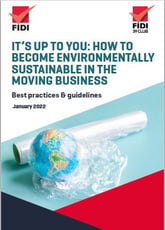Jan 18, 2022 Sustainability in the Household Goods Moving Industry
By Ben Heller
I recently sat down with Jessica Deutschmann, Partner Relationships Manager at Gosselin and President of the FIDI 39 Club to discuss the important topic of sustainability in the household goods moving industry. It was a great way to kick off the new year, and to put the focus on some of the constructive things our industry can do to lower our impact on the environment.
Here are the highlights from our conversation. You can also listen to the full interview here.
Why should global mobility and movers care about household goods impact on sustainability?
Our industry is highly resource-intensive. Packing materials, fuel, freight, all add up to a significant environmental impact. More and more customers are seeking better, greener choices in their day-to-day purchasing decisions. But this is not just a consumer issue – it’s also becoming a question of employee engagement. Environmental awareness and action is a hot topic among today’s youth, and movers should have good policies and practices in place if they want to be relatable as employers.
How can movers impact environmental sustainability?
There are many things we can do to live and work in a more sustainable way, like turning off our computers at night and not leaving all the plugs in. In Europe, there are government regulations in place for movers to ensure our vehicles are operating at a certain standard. At Gosselin, we're trying to expand that across our entire footprint by meeting higher standards in some of the countries where the government legislations might not be as strict as they are in Western European countries. Movers can also be more conscious about recycling packing materials, and innovate by using different packing materials – which will only help their business given the recent spike in the price of cardboard.
What changes do you think are necessary to the buyer and the buying process to improve the use of sustainable household goods moving methodologies?
I think the most important thing is to raise awareness with reporting that shows the actual CO2 emissions of a move. For example, we could provide comparisons between packing materials and shipment modes to illustrate which have the highest CO2 emissions, and educate people on alternatives like consolidated transport and groupage. If we look at it this way, movers will also be able to more easily identify which are the low hanging fruit in terms of immediate improvements they can make to their business. This transparency will benefit both the mover and the consumer or corporate client by allowing people to make moving decisions that align with their values.
_________________________________________________________________
Further reading: “2022 FIDI Guidelines: How to become environmentally sustainable in the moving business”
The road to sustainability is long, but we can all play a part. The FIDI report outlines concrete steps movers can take towards a more sustainable business strategy.
 Further reading:
Further reading:
2022 FIDI Guidelines:
How to become environmentally sustainable
in the moving business
The road to sustainability is long, but we can all play a part. The FIDI report outlines concrete steps movers can take towards a more sustainable business strategy. Here are some of the guiding principles movers can adopt to begin to make change.
- Accept and embrace change. The road to sustainability is long, but we can all play a part. In our talk, Jessica made clear the importance of moving from talk to policy – that starts with taking stock of the measures you can improve sustainability in your business and putting an action plan in place.
- Show and incentivize leadership. To reach ambitious goals like net-zero by 2050, the world needs leadership. If sustainability becomes part of your culture, then everyone in the company can work towards these important, quantifiable goals.
- Set goals. And track them. Whether bigger systemic changes or small everyday actions, it all contributes to the way forward. Keep your metrics simple and celebrate your progress as a team.
- Seek impact through collaboration. Nobody can do this alone. Involve your staff, incentivize your suppliers, educate your customers, and most importantly – share with your peers. Finding efficiencies is key to our collective success.
- Communicate about what you’re doing. When plans get put into action and change begins to happen, talk about it! This will create transparency within your customer and supplier network, open conversation, and make your efforts more relatable to everyone.
I invite you to listen to the interview and read the FIDI report.
Want to discuss how improved business intelligence can help your customer and partner network? 
Cheers,
Ben
CEO Ben fell in love with the mobility industry while running Accentureʼs global mobility consulting practice. Focusing on the mobility supply chain, he learned the hard way that move pricing is complicated, unclear, and vulnerable to manipulation. After evaluating all existing alternatives, Ben partnered with Ryan to make data-driven moving decisions possible.

